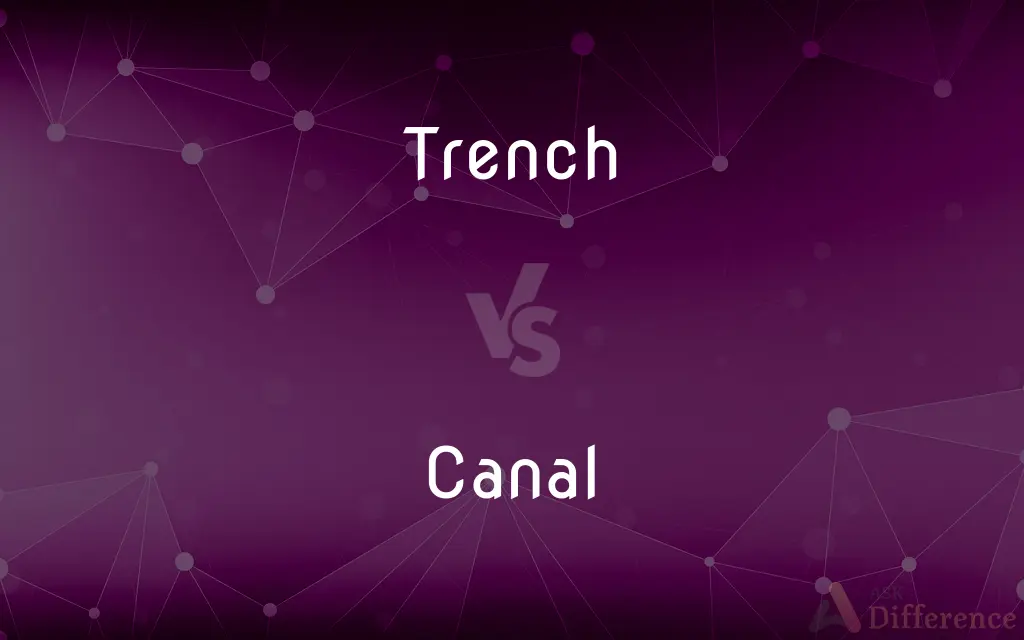Trench vs. Canal — What's the Difference?
By Tayyaba Rehman & Maham Liaqat — Updated on March 7, 2024
A trench is a deep, narrow excavation in the ground, made for military defense, drainage, or utility lines, whereas a canal is a man-made waterway constructed to allow for the passage of boats or for irrigation.

Difference Between Trench and Canal
Table of Contents
ADVERTISEMENT
Key Differences
Trenches are primarily excavated for the purpose of military defense, allowing soldiers to be concealed and protected from enemy fire. These are often temporary and are characterized by their depth and narrowness. On the other hand, canals are engineered channels designed to facilitate water transport or irrigation. Unlike trenches, canals are built with the intention of being permanent structures, contributing to navigation, water management, or agricultural irrigation systems.
While trenches can also serve non-military purposes like laying utility lines, drainage, or irrigation, they are not meant for navigation or continuous water flow in the same way canals are. Canals, conversely, are specifically constructed to either connect two larger bodies of water, such as seas or rivers, or to bring water to a certain location, significantly impacting trade, travel, and agriculture on a large scale.
The construction of a trench is relatively simple and quick, often requiring just basic excavation equipment, and can be done in various types of terrain. Canals, however, require extensive planning, engineering, and maintenance to ensure they serve their purpose effectively, often involving locks, dams, and gates to manage water levels and flow.
Trenches are typically dry, unless designed for drainage or irrigation, and do not support transportation or navigation. Whereas canals are filled with water and play a crucial role in facilitating the movement of goods and people, significantly influencing economic and social landscapes by improving accessibility and trade routes.
Trenches are narrow, often temporary excavations with various purposes, including military defense and infrastructure development, that do not support navigation. Canals, however, are permanent, man-made waterways designed specifically to facilitate water transport and irrigation, playing a vital role in economic, social, and environmental systems.
ADVERTISEMENT
Comparison Chart
Primary Purpose
Military defense, drainage, utility lines.
Navigation, irrigation, water management.
Construction
Simple excavation, temporary.
Complex engineering, permanent structures.
Use
Concealment, protection, infrastructure.
Transportation, irrigation, economic development.
Water Presence
Generally dry unless designed otherwise.
Always contains water.
Impact
Tactical advantage, infrastructure support.
Economic, environmental, social significance.
Compare with Definitions
Trench
Trenches can be temporary.
The construction team dug a trench for the foundation, which was later filled.
Canal
Canals often have locks.
The lock system in the canal manages water levels for navigation.
Trench
A trench is a deep, narrow excavation.
Soldiers dug a trench for protection during the battle.
Canal
Some canals are used for irrigation.
The canal irrigates thousands of acres of farmland.
Trench
Trenches can facilitate drainage.
A trench was dug to prevent waterlogging in the field.
Canal
Canals impact trade routes.
The Suez Canal is a crucial shortcut for international shipping.
Trench
Trench warfare was a common strategy.
Trench warfare defined much of World War I.
Canal
Canals facilitate boat passage.
Goods are transported through the canal to reach inland cities.
Trench
Utility lines are often laid in trenches.
The company excavated a trench to lay new fiber-optic cables.
Canal
A canal is a man-made waterway.
The Panama Canal connects the Atlantic and Pacific Oceans.
Trench
A trench is a type of excavation or depression in the ground that is generally deeper than it is wide (as opposed to a wider gully, or ditch), and narrow compared with its length (as opposed to a simple hole or pit).In geology, trenches result from erosion by rivers or by geological movement of tectonic plates. In civil engineering, trenches are often created to install underground utilities such as gas, water, power and communication lines.
Canal
Canals are waterway channels, or artificial waterways, for water conveyance, or for servicing water transport vehicles. They carry free surface flow under atmospheric pressure, and can be thought of as artificial rivers.
Trench
A long, narrow ditch
Dig a trench around the perimeter of the fire
Canal
An artificial waterway constructed to allow the passage of boats or ships inland or to convey water for irrigation
The Oxford Canal
They travelled on by canal
Trench
A long, narrow, deep depression in the ocean bed, typically one running parallel to a plate boundary and marking a subduction zone
The Marianas Trench
Canal
A tubular duct in a plant or animal, serving to convey or contain food, liquid, or air
The ear canal
Trench
A trench coat.
Canal
Any of a number of linear markings formerly reported as seen by telescope on the planet Mars.
Trench
Dig a trench or trenches in (the ground)
She trenched the terrace to a depth of 6 feet
Canal
An artificial waterway or artificially improved river used for travel, shipping, or irrigation.
Trench
Border closely on; encroach on
This would surely trench very far on the dignity and liberty of citizens
Canal
(Anatomy) A tube, duct, or passageway.
Trench
A deep furrow or ditch.
Canal
(Astronomy) One of the faint, hazy markings resembling straight lines on early telescopic images of the surface of Mars.
Trench
A long narrow ditch embanked with its own soil and used for concealment and protection in warfare.
Canal
To dig an artificial waterway through
Canal an isthmus.
Trench
A long, steep-sided valley on the ocean floor.
Canal
To provide with an artificial waterway or waterways.
Trench
To dig or make a trench or trenches in (land or an area, for example).
Canal
An artificial waterway or artificially improved river used for travel, shipping, or irrigation.
Trench
To place in a trench
Trench a pipeline.
Canal
(anatomy) A tubular channel within the body.
Trench
To dig a trench or trenches.
Canal
(astronomy) One of the faint, hazy markings resembling straight lines on early telescopic images of the surface of Mars; see Martian canals
Trench
To encroach. Often used with on or upon
"The bishop exceeded his powers, and trenched on those of the king" (Francis Parkman).
Canal
To dig an artificial waterway in or to (a place), especially for drainage
Trench
To verge or border. Often used with on or upon
"a broad playfulness that trenched on buffoonery" (George Meredith).
Canal
To travel along a canal by boat
Trench
A long, narrow ditch or hole dug in the ground.
Canal
An artificial channel filled with water and designed for navigation, or for irrigating land, etc.
Trench
(military) A narrow excavation as used in warfare, as a cover for besieging or emplaced forces.
Canal
A tube or duct; as, the alimentary canal; the semicircular canals of the ear.
Trench
(archaeology) A pit, usually rectangular with smooth walls and floor, excavated during an archaeological investigation.
Canal
A long and relatively narrow arm of the sea, approximately uniform in width; - used chiefly in proper names; as, Portland Canal; Lynn Canal.
Trench
(informal) A trench coat.
Canal
(astronomy) an indistinct surface feature of Mars once thought to be a system of channels; they are now believed to be an optical illusion
Trench
To invade, especially with regard to the rights or the exclusive authority of another; to encroach.
Canal
A bodily passage or tube lined with epithelial cells and conveying a secretion or other substance;
The tear duct was obstructed
The alimentary canal
Poison is released through a channel in the snake's fangs
Trench
To excavate an elongated pit for protection of soldiers and or equipment, usually perpendicular to the line of sight toward the enemy.
Canal
Long and narrow strip of water made for boats or for irrigation
Trench
(archaeology) To excavate an elongated and often narrow pit.
Canal
Provide (a city) with a canal
Trench
To have direction; to aim or tend.
Trench
To cut; to form or shape by cutting; to make by incision, hewing, etc.
Trench
To cut furrows or ditches in.
To trench land for the purpose of draining it
Trench
To dig or cultivate very deeply, usually by digging parallel contiguous trenches in succession, filling each from the next.
To trench a garden for certain crops
Trench
To cut; to form or shape by cutting; to make by incision, hewing, or the like.
The wide wound that the boar had trenchedIn his soft flank.
This weak impress of love is as a figureTrenched in ice, which with an hour's heatDissolves to water, and doth lose its form.
Trench
To fortify by cutting a ditch, and raising a rampart or breastwork with the earth thrown out of the ditch; to intrench.
No more shall trenching war channel her fields.
Trench
To cut furrows or ditches in; as, to trench land for the purpose of draining it.
Trench
To dig or cultivate very deeply, usually by digging parallel contiguous trenches in succession, filling each from the next; as, to trench a garden for certain crops.
Trench
To encroach; to intrench.
Does it not seem as if for a creature to challenge to itself a boundless attribute, were to trench upon the prerogative of the divine nature?
Trench
To have direction; to aim or tend.
Like powerful armies, trenching at a townBy slow and silent, but resistless, sap.
Trench
A long, narrow cut in the earth; a ditch; as, a trench for draining land.
Trench
An alley; a narrow path or walk cut through woods, shrubbery, or the like.
In a trench, forth in the park, goeth she.
Trench
An excavation made during a siege, for the purpose of covering the troops as they advance toward the besieged place. The term includes the parallels and the approaches.
Trench
A ditch dug as a fortification having a parapet of the excavated earth
Trench
A long steep-sided depression in the ocean floor
Trench
Any long ditch cut in the ground
Trench
Impinge or infringe upon;
This impinges on my rights as an individual
This matter entrenches on other domains
Trench
Fortify by surrounding with trenches;
He trenched his military camp
Trench
Cut or carve deeply into;
Letters trenched into the stone
Trench
Set, plant, or bury in a trench;
Trench the fallen soldiers
Trench the vegetables
Trench
Cut a trench in, as for drainage;
Ditch the land to drain it
Trench the fields
Trench
Dig a trench or trenches;
The National Guardsmen were sent out to trench
Common Curiosities
Why are trenches dug in warfare?
Trenches provide soldiers with concealment and protection from enemy fire.
What makes canals important for trade?
Canals shorten travel distances, facilitating quicker and more economical transportation of goods.
What are the key differences between a trench and a canal?
The key differences include purpose (military defense vs. navigation/irrigation), water presence, and construction complexity.
Can trenches be used for purposes other than military?
Yes, trenches can be used for drainage, irrigation, and laying utility lines.
How do canals affect agriculture?
Canals provide a reliable water source for irrigation, enhancing agricultural productivity.
How do locks work in canals?
Locks raise and lower ships between stretches of water of different levels on river and canal waterways.
Can trenches become permanent structures?
While primarily temporary, trenches for infrastructure can be permanent if not filled in after use.
What is trench warfare?
Trench warfare is a type of combat where armies fight from protective trenches dug in the ground.
Do canals always connect two bodies of water?
Not always; some canals are designed solely for irrigation or to bring water to specific areas.
Are all canals man-made?
Yes, by definition, canals are artificial waterways created for specific purposes.
How are trenches constructed?
Trenches are constructed through excavation, often manually or with machinery, depending on the purpose and scale.
Can canals be natural?
Natural waterways may be modified into canals, but true canals are entirely man-made.
What environmental impact do canals have?
Canals can alter local ecosystems, impact water tables, and sometimes lead to habitat destruction.
What is the significance of historic canals?
Historic canals showcase engineering achievements and have significantly influenced trade and settlement patterns.
How do trenches and canals impact infrastructure?
Trenches support infrastructure by housing utilities, while canals enhance transportation and irrigation systems.
Share Your Discovery

Previous Comparison
Tbs vs. Tbsp
Next Comparison
Contrition vs. RemorseAuthor Spotlight
Written by
Tayyaba RehmanTayyaba Rehman is a distinguished writer, currently serving as a primary contributor to askdifference.com. As a researcher in semantics and etymology, Tayyaba's passion for the complexity of languages and their distinctions has found a perfect home on the platform. Tayyaba delves into the intricacies of language, distinguishing between commonly confused words and phrases, thereby providing clarity for readers worldwide.
Co-written by
Maham Liaqat













































